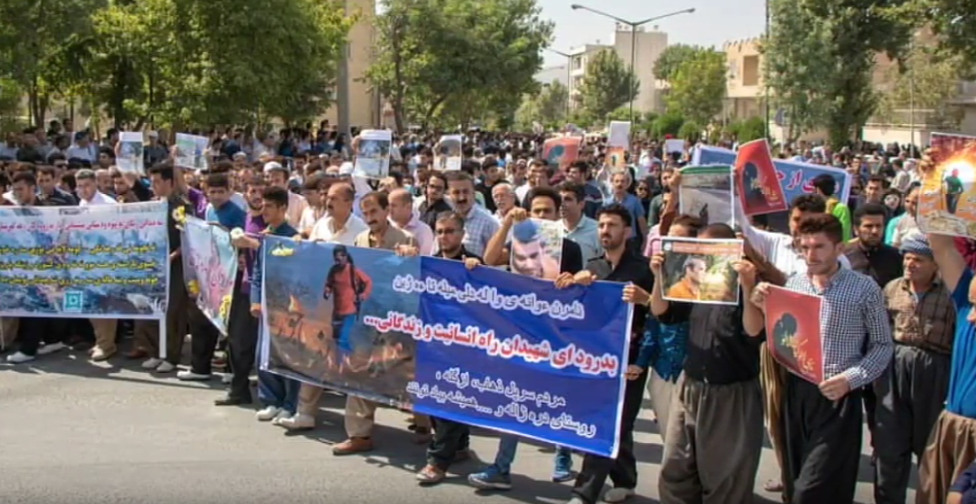Washington Kurdish Institute
By: Robert Sanford June 25, 2019
During the last half-century, as the prospect of climate change-related crises has grown, scholars have increasingly labeled environmental change as a security issue rather than a purely geoscientific topic. For the Iranian-Kurds, or Rojhelatis (Eastern people of Kurdistan), the reasons for this securitization of climate change are crystal clear. Due to a malignant combination of government persecution and environmental degradation, Rojhelatis are forced to make an excruciating choice: protest in the name of environmental justice and risk imprisonment or death, or remain silent as the source of their livelihood deteriorates around them.
Environmental degradation is a serious crisis for all of Iran, but as a result of extreme disenfranchisement, Kurds and other ethnic minority groups are the least insulated from its debilitating effects. Iranian Kurdistan, or Rojhelat, is made up of three mountainous provinces in Iran’s northwest region, West Azerbaijan, Kurdistan, and Kermanshah. Although Rojhelati Kurds number around 10% of Iran’s total population, they carry little, if any, national influence; by splitting Kurds into three administrative provinces, the regime hinders any attempt at political and social organization. The political parties that have been able to form are both exiled and largely in disarray.
This lack of governmental representation and administrative organization exacerbates the effects of environmental crises facing Rojhelati Kurds. Lake Urmia, once the sixth-largest saltwater lake in the world, has shrunk by 90% since the 1970s as a result of damming and agricultural water mismanagement permitted or perpetrated by the regime. Given its location along the majority-Kurd provinces of West Azerbaijan and Kurdistan, Urmia’s desiccation is more than an aesthetic and ecological disaster; the newly-exposed lake bed morphs typically innocuous gusts of wind into vicious salt and dust storms that damage nearby crop fields, pollute the air, and force migration. In fact, Rojhelat is home to two of the world’s ten most polluted cities, Sanandaj and Kermanshah. The deadly effects of this pollution have already taken hold; a 2013 medical study of hospitals in Kermanshah found a positive correlation between spikes in aerial dust concentration and increases in cardiac and respiratory patients and deaths.
The loss of water itself is another environmental stressor for Rojhelati Kurds. Climate change, population growth, and the regime’s aforementioned history of water mismanagement pose an enormous threat to Iran as a whole, but as all bodies of water in Iran are controlled by Tehran’s Ministry of Energy, peripheral regions like Rojhelat will face the brunt of these crises. Diversion of rivers and streams via damming is a common method of retaining water for human use; however, 2014 environmental report on Iran revealed that 26 of 30 dams constructed in the provinces of West Azerbaijan, East Azerbaijan, and Kurdistan benefit Azeri Turks, a predominantly Shi’a ethnic group allotted more political representation by the regime, while Kurdish-majority areas are frequently denied infrastructure projects. Water in Iran, as the report’s title notes wryly, “flows toward power.”
Rojhelati Kurds have not stayed silent in the face of these injustices. At the turn of the 21st century, as Lake Urmia rapidly vanished and the regime redirected water from Rojhelat, activists from a variety of ethnic and socioeconomic backgrounds began to form environmental justice groups, like Chya the Green Organization, that educate citizens on environmental issues, organize beneficial projects, and fight forest fires. Green activism quickly became a central tenet of the Rojhelati liberation movement; as advocation for environmental causes was less likely to draw the ire of regime intelligence officials than outright political dissent, Kurds and other minorities were able to organize and combat injustices, largely without fear of reprisal.
This is no longer the case. While Iran’s general water mismanagement and pollution represent more passive forms of oppression, the regime also actively persecutes Kurds by setting fires to Rojhelat’s forests and jailing environmental activists. A 2017 UN report found that Kurds represent around half of Iran’s political prisoners, a disturbingly high proportion given the state’s demographics, and Amnesty International detailed a deliberate detention campaign against environmentalists in a January 2019 article. Under the guise that it is fighting Kurdish terrorists, the Islamic Revolutionary Guard Corps (IRGC) frequently bombards and ignites Rojhelati grounds and forests. In the fall of 2018, four Kurdish environmentalists died as they battled forest fires caused by a series of IRGC artillery strikes. Among them was Sharif Bajwar, a respected civil and environmental activist who preached non-violence along his quest for human rights.
Remarkably, the regime’s draconian policy of imprisoning, torturing, and executing peaceful activists has failed to deter the Rojhelati Kurds from continuing their battle for a clean, inhabitable environment. Bajwar’s funeral was attended by thousands in his hometown of Mariwan, and later, protesters courageously took to the streets to pledge their enduring support for the movement.
“Mr. Sharif,” they shouted. “The struggle you have taken will continue.”

